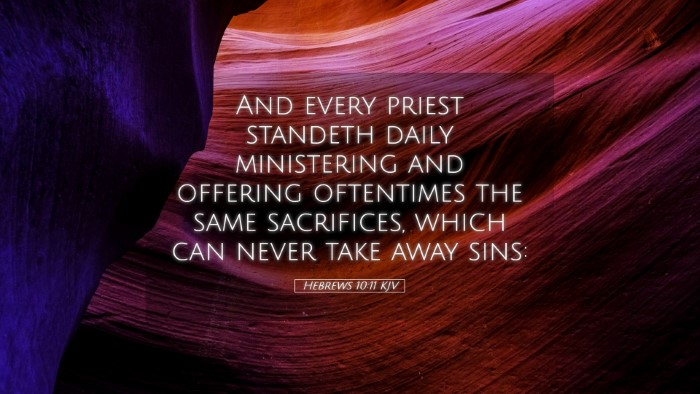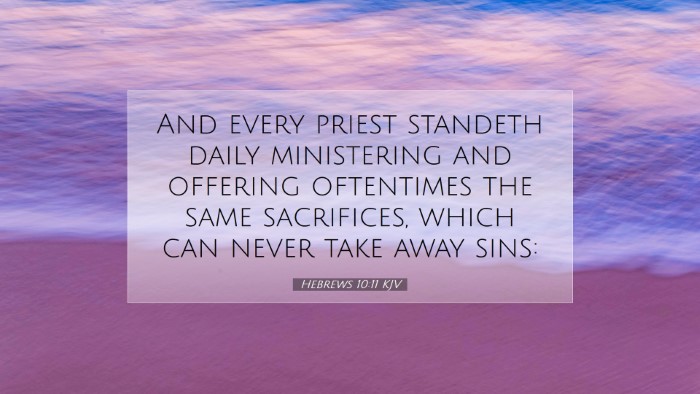Commentary on Hebrews 10:11
The verse Hebrews 10:11 states:
"And every priest stands ministering daily and offering repeatedly the same sacrifices, which can never take away sins."
This passage provides critical insights into the theme of sacrificial worship under the Old Covenant and contrasts it with the ultimate sacrifice of Christ under the New Covenant.
Overview of Sacrificial System
In the context of Hebrews, the author emphasizes the role of the Levitical priesthood and their daily service in the temple. Matthew Henry notes that the priests were constantly engaged in their duties, offering sacrifices repeatedly.
- Daily Ministry: The phrase "stands ministering daily" indicates the ongoing, never-ending nature of the sacrificial offerings, highlighting the persistent need for atonement.
- Repeated Sacrifices: The repetitive nature of these sacrifices underscores their inadequacy and inability to fully atone for sin.
- Limitations of the Old Covenant: The sacrifices, though commanded by God, were ultimately ineffective in removing sin, pointing to the need for a superior solution.
The Role of the Priest
The role of the priest in the Old Testament system is imperative for understanding the full impact of Jesus’ sacrifice. Albert Barnes highlights that the priests stood as intercessors between the people and God, yet their offerings were mere symbols of the true and lasting atonement that was to come.
Characteristics of the Priestly Office:
- The priests were ordained to represent the people before God, but they themselves were also sinners.
- They could only offer animal sacrifices, which were ultimately insufficient to deal with the root problem of sin.
- Their continuous work showcased the ongoing plight of humanity in its need for redemption.
Contrast With Christ's Sacrifice
The author of Hebrews draws a sharp contrast between the Levitical priesthood and Christ. Adam Clarke points out that while the priests had to stand and offer the same sacrifices, Christ offered Himself once for all, forever perfecting those who are sanctified.
- Finality: Unlike the Levitical priests, Christ's offering was made once and was effective to remove sin definitively (Hebrews 10:12).
- Redemption: His sacrifice not only atoned for sins but also provided a means of reconciliation with God, fulfilling the requirements of the Law completely.
- Rest After Sacrifice: Christ sat down at the right hand of God following His sacrifice, symbolizing the completion of His work (Hebrews 10:12-13).
Theological Implications
The theological ramifications of Hebrews 10:11 are profound. This verse serves to illustrate:
- The Inadequacy of the Law: As verse 11 reflects, the sacrifices of the Law could never truly cleanse; they served only as a foreshadowing of the perfect sacrifice that was to come.
- The Sufficiency of Christ: The contrast between the old system and Christ emphasizes His role as the sufficient Savior who fulfills the Law's righteous demands.
- The New Covenant: This passage invites believers to embrace the New Covenant, where Christ's sacrifice is the cornerstone of faith, offering hope and redemption.
Pastoral Applications
For pastors and ministers, Hebrews 10:11 provides rich material for preaching the Gospel. Consider:
- Grace Over Works: The futility of ritualistic religion is a prevailing theme; it encourages an understanding that salvation is by grace through faith, not by works.
- Hope in Christ: Emphasize the assurance that in Christ, believers are fully cleansed and accepted by God due to His perfect sacrifice.
- Call to Worship: Encourage congregants to worship without the burden of guilt, recognizing that Christ's sacrifice has secured their redemption.
Conclusion
In summary, Hebrews 10:11 encapsulates the tension between the Old and New Covenant sacrificial systems. Through the insights of Matthew Henry, Albert Barnes, and Adam Clarke, we see the profound implications of the transition from repetitive offerings to the singular, sufficient sacrifice of Christ. This passage is a call to comprehend the depths of Christ’s atonement and the grace that flows from His completed work on the cross, inviting deeper worship and understanding for all believers.


